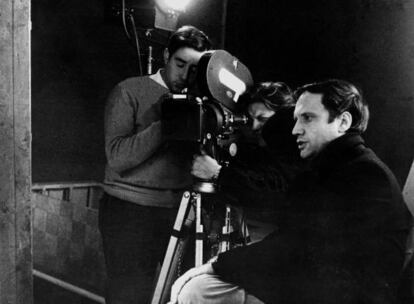Pere Portabella: “We’re close to chaos”
The radical Catalan filmmaker is releasing his complete works on DVD


In an interview filmed in 1992 the poet Joan Brossa described himself in front of his friend Pere Portabella as “an inventor of strategies, a rebel against official culture.” The description could just as well have served to describe Portabella himself. Back when they were neighbors on Balmes street in Barcelona, Brossa acted as an esthetic guide to the then-young apprentice as he made his definitive break from the safe path of the family business — no less than yoghurt giant Danone — and immersed himself in the uncertain waters of cinema, avant-garde art and politics. The fact that at the end of the 1960s Portabella asked Brossa to write the script for his first film, No compteu amb els dits, was a declaration of the intentions around which his work continues to revolve.
Now Portabella’s complete works are about to be released for the first time on DVD (Intermedio), offering the chance to get to know a body of work that has been crisscrossing the waters of experimental cinema, documentary and dreams for the last four decades — from his four short films about artist Joan Miró (1969) to the renowned Vampir-Cuadecuc (1970), an odd documentary about the making of the late Jess Franco’s Drácula, starring Christopher Lee, and Informe general sobre unas cuestiones de interés para una proyección pública (1976), a wide-ranging documentary about Spain’s Transition to democracy.
The producer of three landmarks of Spanish cinema — Carlos Saura’s Los golfos, Marco Ferreri’s El cochecito and Luis Buñuel’s Viridiana, the latter winning him the Palme d’Or at Cannes — the now 84-year-old Portabella has survived outside of a film industry that never considered him one of its own. “My relationship with the industry has simply never existed,” he explains in a hotel in Madrid. “My work wasn’t interesting. No producer has ever called me, which is logical as I didn’t make a product. But I have survived very pleasantly. I don’t consider myself shunned. Things are as they are and I have looked for an alternative path that wasn’t only focused on film.”
Ten years ago Portabella set up the Fundación Alternativas, a leftist foundation that had the aim of putting a break on a disillusionment that at the time only he glimpsed. “We are living in a time of confusion, paternalism is over,” he says. “We are close to chaos, but they are the preliminary stages for building something. I’m optimistic and I think a very interesting political subject exists: the social movements. And even though in the institutions they want to tell us that they are worthless, that they aren’t proposing anything, it’s false. They are an active body that doesn’t need to fill up squares [with protests] any more. [...] I am not disillusioned, I am one of the indignant ones, and I subscribe to that wonderful radical and poetic slogan that I saw in 15-M: ‘If you won’t let us dream, we won’t let you sleep’.”
His family did not approve of his chosen path, but Portabella — who is also preparing for an upcoming retrospective of his work at the Reina Sofía museum in Madrid — never denied his origins. “My father told me that I was an intelligent person but that none of my activities, neither cinema nor politics, was serious. He was a lawyer, but he teamed up with the son of Isaac Calasso, a Jew from Thessaloniki who made yoghurts for drug stores. At the end of the war he and Daniel Calasso saw the future of yoghurts and founded Danone. The trick was that from day one they linked yoghurts with health. I gave up that life, but I can never forget that I come from there. It’s funny, but with a brand like mine nobody has ever, at any meeting, called me a loser. I’ve been lucky.”







































